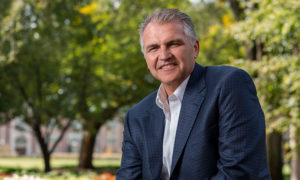 David Patterson Silver Wolf, associate professor at the Brown School
David Patterson Silver Wolf, associate professor at the Brown School
One of the reasons I became an addiction counselor and obtained advanced degrees in social work was my awareness that people in power neither resembled nor came from those communities most in need.
In 1990, after I completed a 30-day addiction treatment program in Louisville, Kentucky, I decided that rather than returning to my job as a garbage man, I would enroll in the local community college and get an education. The only way I could pull that off was to enter the VOA – the Volunteers of America – and that meant living in a group home for over two years.
At VOA, I lived with men who were homeless, addicted to alcohol and drugs, and suffering from other disorders. I looked like them, and they looked like me. Which is probably why, when my fellow residents had appointments with people who were supposed to help them, they asked me to accompany them.
Like me, most of these men came from marginalized communities. Most of the “helping” professionals didn’t.
Read the full piece in the St. Louis American.
Comments and respectful dialogue are encouraged, but content will be moderated. Please, no personal attacks, obscenity or profanity, selling of commercial products, or endorsements of political candidates or positions. We reserve the right to remove any inappropriate comments. We also cannot address individual medical concerns or provide medical advice in this forum.